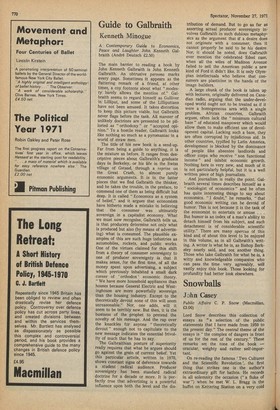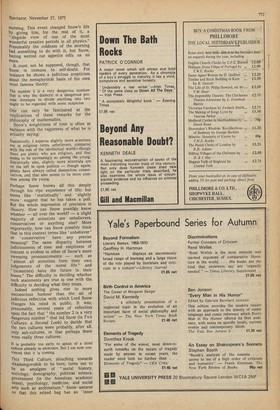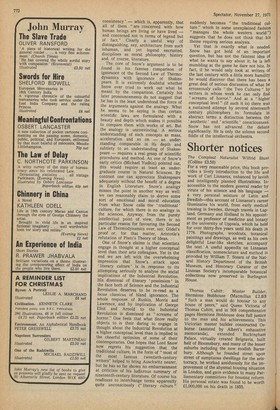Snowballs
J3hn Casey Public Affairs C. P. Snow (Macmillan, £3.00) Lord Snow describes this collection of essays as "a selection of the public statements that I have made from 1959 to the present day." The central theme of the essays is "the complex of dangers in front of us for the rest of the century." These remarks set the tone of the book — oracular, weighty and rather self-important.
On re-reading the famous 'Two Cultures and the Scientific Revolution ', the first thing that strikes one is the author's extraordinary gift for bathos. He records in all solemnity the occasion (" a fluke of war ") when he met W. L. Bragg in the buffet on Kettering Station on a very cold morning. This event changed Snow's life by giving him, for the rest of it, a "ringside view of one of the most wonderful creative periods in all physics." Presumably the coldness of the morning had something to do with it, but Snow, having wetted our appetite tells us no more.
It must not be supposed, though, that Snow is immune to self-doubt. For instance he shows a judicious scepticism about the metaphysical basis of his own most famous theory:
The number 2 is a very dangerous number: that is why the dialectic is a dangerous process. Attempts to divide anything into two ought to be regarded with some suspicion.
One can only be fascinated at the implications •of these remarks for the Philosophy of mathematics.
Snow's weightiness of tone is often at variance with the vagueness of what he is actually saying:
Statistically, I suppose slightly more scientists are in religious terms unbelievers, compared With the rest of the intellectual world—though there are plenty who are religious, and that seems to be increasingly so among the young. Statistically also, slightly more scientists are on the left in open politics — though again, Plenty have always called themselves conservatives, and that also seems to be more common among the young.
Perhaps Snow knows all this simply through his ripe experience of life; but terms like statistically ' and ' slightly more' suggest that he has taken a poll. But the whole impression of precision is Illusory. How can Snow possibily know Whether — all over the world? — a slight majority of scientists are unbelievers, conservatives or anything else? More importantly, how can Snow possibly think that in this context terms like ' unbeliever' or ' conservative ' have any precise meaning? The same disparity between Judiciousness of tone and emptiness of content is evident in other of Snow's more sweeping pronouncements — such as "almost all scientists form their own judgements of the moral life" and "(scientists) have the future in their bones," The difficulty in deciding whether such statements are true is one with the difficulty in deciding what they mean.
Indeed nothing gives rise to more unconscious humour than the air of judicious reflection with which Lord Snow Changes his mind in public. It was, Presumably, several years of reflection Upon the fact that "the number 2 is a very dangerous number" that led Snow (in Two Cultures: a Second Look) to decide that the two cultures were probably, after all, Only sub-cultures, or that perhaps there were really three cultures: It is probably too early to speak of a third culture already in existence. But I am now convinced that it is coming.
This Third Culture, slouching towards Akademgorodok to be born, turns out to be an amalgam of "social history, sociology, demography, political science, government (in the American academic sense), psychology, medicine, and social arts such as •architecture." Snow assures US that this Mixed bag has an 'inner
consistency' — which is, apparently, that all of them "are concerned with how human beings are living or have lived — and concerned not in terms of legend but of fact." Clearly a useful way of distinguishing, say, architecture from such inhuman, and yet legend encrusted, disciplines as moral philosophy, history and, of course, literature.
The core of Snow's argument is to be found in his famous comparison of ignorance of the Second Law of Thermodynamics with ignorance of Shakespeare. It is extremely doubtful whether Snow ever tried •to work out what he meant by the comparison. Certainly his later pronouncements do not suggest that he has in the least understood the force of the arguments against the analogy. What he seems to be saying is that certain scientific laws are formulated with a beauty and depth which makes it possible to compare them with works of art. But the analogy is unconvincing. A serious understanding of such concepts as mass, acceleration and so on — an understanding comparable in its depth and subtlety to an understanding of Shakespeare — requires a real grasp of scientific procedures and method. As one of Snow's early critics (Michael Yudkin) pointed out, this would require at least an undergraduate course in Natural Sciences. By contrast one can appreciate Shakespeare adequately without the benefit of a degree in English Literature. Snow's analogy misses the point in another way as well: we can reasonably claim to derive some sort of emotional and moral education from what Snow calls the 'traditional ' culture, for which there is no analogy in the sciences. Anyway, from the purely intellectual point of view, there is no particular reason for favouring the Second Law of Thermodynamics over, say, Gliders proof or, for that matter, Aristotle's refutation of Plato's Theory of Ideas.
One of Snow's claims is that scientists engage in thought at a higher conceptual level than their arts colleagues. Yet in the end we are left with the overwhelming impression that Snow's attack upon 'literary culture ' is in response to its attempting seriously to analyse the social implications of the Industrial Revolution. His dismissal of literary pessimism ' in the face both of Science and the Industrial Revolution deserves to be re-read as a locus classicus of bland ignorance. The whole response of Ruskin, Morris and Lawrence, and by implication of George Eliot and Arnold to the Industrial Revolution is dismissed as " screams of horror." One feels that what Snow really objects to is their daring to engage in thought about the Industrial Revolution at a higher conceptual level than is implied in the cheerful optimism of some of their contemporaries. One hopes that Lord Snow now regrets his suggestion that the traditional culture, in the form of " most of the most famous twentieth-century writers" helped to bring Auschwitz nearer, but he has so far shown no embarrassment at criticism of his ludicrous summary of nineteenth-century literature. Of course his readiness to interchange terms apparently quite unconsciously (" literary culture " suddenly becomes "the traditional culture " which in some unexplained fashion "manages the whole western world '') suggests that he does not think that his theme requires serious analysis.
Yet that is exactly what is needed. Snow has got hold of an important question, but has not the faintest idea of what he wants to say about it; he is left mumbling at the game he dare not bite. In fact, if he would only look at writers of the last century with a little more humility he would discover that there has been a great deal of serious discussion of what he erroneously calls "the Two Cultures " by writers in whose work he can only find "screams of horror." And at a "higher conceptual level" (if such it is) there was a sustained attempt by several nineteenth century philosophers to formulate in abstract terms a distinction between the ' aesthetic ' and ' scientific ' consciousness. Snow has not advanced the debate significantly. He is only the solemn second fiddle of the intellectual orchestra.
















































 Previous page
Previous page